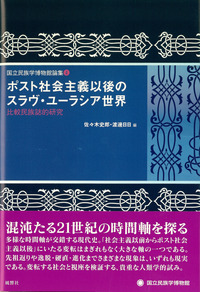
Title
Posuto-Shakaishugi igono Suravu-Yurashia Sekai (The Slavic-Eurasian World after Post-Socialism: A Comparative Ethnography)
Size
288 pages, A5 format
Language
Japanese
Released
March 31, 2016
ISBN
978-4-894-89226-2
Published by
Fukyosha Publishing
Book Info
See Book Availability at Library
Japanese Page
This book, edited with Professor Shiro Sasaki, is a collection of essays which intends to capture the "post-post" era, which followed the socialist regime in Northern Eurasia, from the perspective of cultural anthropology. Granted by the National Museum of Ethnology (October 2008 - March 2012), the collection forms the third and concluding part of our joint research on post-socialist phenomena in the former Soviet Union and former Eastern Europe (following “Anthropological Studies on the Structural Transitions of Ethnic and/or Regional Communities on Post-Socialist States,” 2003 and “Perspectives of Post-Socialist Anthropology,” 2008.).
Our project is based on the conception of "post-post-socialism." Following the collapse of the socialist polity in 1989–1991 and during the 1990s, every aspect of society (politics, law, culture, etc.) contained within the vast area from the Berlin Wall to the Kamchatka Peninsula was in transition, which, to put it bluntly, resulted in a state of confusion, disorder, and chaos. The socialist period was remembered as a "good" frame of reference, and the present situation was defined in comparison with the recalled socialism of the past. In this sense, the 1990s was an era of “post-socialism.” However, by the 2000s, when Russia had already become one of the BRIC countries, the socialist era and its system were no longer the dominant frame of reference; the current historical awareness is now characterized by what and how has changed compared to the 1990s. This change can be evaluated as the birth of an era of “post-post-socialism.”
In this light, the previous framework for analysis needed to be updated. Various perspectives and concepts covering the anthropology of post-socialism (for instance, ownership, ethno-nationality, civil society, religious revival, etc.) had to be reexamined. Our study addresses these theoretical issues through comparative research on the various regions of the Russian Federation, Slovakia, Kazakhstan, Uzbekistan, Mongolia, and China.
This book is the final work included in our research project on “anthropology of (post-) post-socialism” and will not only contribute to cultural anthropology and comparative ethnography but also to area studies on the former Soviet Union and Eastern Europe, as well as Mongolia and China. Further studies are needed in the future within the sphere of social theory, from which the output of comparative-ethnographical studies is reflected; further development of the anthropology and ethnology of Northern Eurasia is also desirable.
(Written by Hibi Watanabe, Professor, Graduate School of Arts and Sciences / 2018)



 Find a book
Find a book

